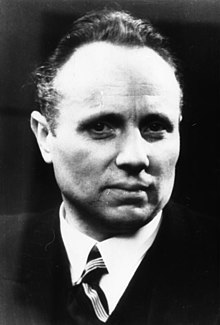Werner Eggerath
Werner Eggerath | |
|---|---|
 Eggerath in 1950 | |
| State Secretary for Church Affairs | |
| In office 1957–1960 | |
| Ambassador of the German Democratic Republic to Romania | |
| In office 1954–1957 | |
| Minister-President of Thuringia | |
| In office September 2, 1947 – July 23, 1952 | |
| Personal details | |
| Born | March 16, 1900 Elberfeld, German Empire |
| Died | June 16, 1977 (aged 77) East Berlin, German Democratic Republic |
| Resting place | Zentralfriedhof Friedrichsfelde |
| Political party | Socialist Unity Party of Germany (1946-) Communist Party of Germany (1924-1946) |
| Alma mater | International Lenin School |
| Awards | Order of Karl Marx (1975) Patriotic Order of Merit Honor clasp, in Gold (1970) Patriotic Order of Merit Gold, 1st Class (1965) National Prize of the German Democratic Republic (1960) Banner of Labor (1960) Medal for Fighters Against Fascism (1958) Patriotic Order of Merit Silver, 2nd class (1955) |
| Military service | |
| Allegiance | Ruhr Red Army (1920) German Empire (1918-1919) |
| Battles/wars | Ruhr Uprising World War One |
Werner Eggerath (16 March 1900, in Elberfeld – 16 June 1977, in East Berlin) was an East German author and communist politician.[1] He was a member of the Socialist Unity Party of Germany (SED / Sozialistische Einheitspartei Deutschlands) and its first secretary in Thuringia from 21 April 1946 to 1947, already having held that position in the Communist Party of Germany before its merger with the SPD, to create, in April 1946, the SED. After having been Minister of the Interior of Thuringia since May 1947, he became its Minister-President on 9 October 1947, which he stayed until 23 July 1952 when the state was abolished.[1] Eggerath also served as Ambassador to Romania from 1954 to 1957[1] and as the State Secretary for Church Affairs.
References[edit]
- ^ a b c Elke Reuter; Helmut Müller-Enbergs. "Eggerath, Werner * 16.3.1900, † 16.6.1977 Ministerpräsident von Thüringen". Wer war wer in der DDR? (in German). Bundesstiftung zur Aufarbeitung der SED-Diktatur. Retrieved 20 January 2015.
Categories:
- 1900 births
- 1977 deaths
- People from Elberfeld
- People from the Rhine Province
- Communist Party of Germany politicians
- Socialist Unity Party of Germany politicians
- Members of the Provisional Volkskammer
- Members of the 1st Volkskammer
- East German diplomats
- Ambassadors of East Germany to Romania
- Members of the Landtag of Thuringia
- Ministers-President of Thuringia
- German male writers
- International Lenin School alumni
- Communists in the German Resistance
- Recipients of the Patriotic Order of Merit (honor clasp)
- Recipients of the Banner of Labor
- Recipients of the National Prize of East Germany
- Recipients of the Medal of Merit of the GDR
- Politicians from Wuppertal
- Socialist Unity Party of Germany politician stubs

